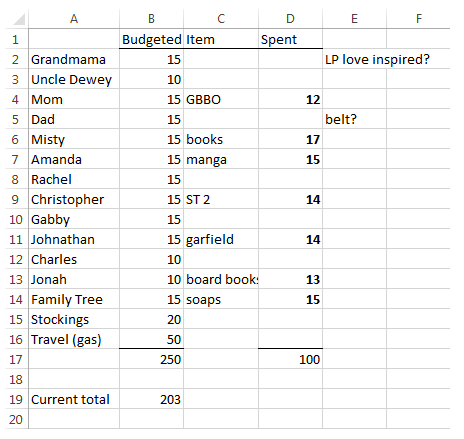The Cost of Keeping Up the Holiday Traditions

Christmas is a big deal to my family, and my family is a big deal in itself. We’re a sprawling but close-knit clan, with an average of 4–5 children per parent couple (themselves usually one of 4–5 kids) and a lot of important traditions. As a member of one of the five-kid families, even shopping for my immediate family is nothing to sneeze at, and Christmas for us goes way beyond wrapping a few packages. My mother is a lifelong Christmasnik, and has infected us all with the holiday fever; if Christmas doesn’t take two weeks and a huge chunk of your budget to celebrate, you’re not doing it right.
To be clear, I am not complaining! I love the way my family does Christmas, and am one of the first to get upset when someone suggests we dial it back. But it does mean that I have to think ahead, to both plan and budget for The Holidays.
First of all, there’s travel. My siblings and I are about evenly divided between Texas and Alabama these days; I’m in the Texas half, and going home for Christmas means synchronizing schedules with the rest of the Texas half to make travel plans as efficient as possible. Here the money question first rears its ugly head; it would be so much easier and faster to fly rather than drive the 700+ miles to Alabama, but there’s no way we can afford it. I can throw in fifty bucks of gas money and take my turn at the wheel a lot easier than I can sink hundreds of dollars into a plane ticket. We always take my car, and vehicular wear and tear is an invisible expense, but one I’d rather pay than suffer a long drive without cruise control or (as my sisters got to experience once) break down on the seamy side of Selma at two in the morning.
Traveling also means time off from work. Currently we’re very lucky; my older sister and I both work for school systems, so a generous holiday break is the norm. At previous jobs, if I could get the time off at all, I’ve had to take unpaid leave at the time of year when I could afford it the least. (Well, I’ve chosen to take unpaid leave; no one forced me, but that’s what this article is about: the sacrifices I make to participate in my family’s traditional Christmas.)
The main expense, of course, is presents. I usually start socking away money for presents in October. I keep a spreadsheet (yay, a spreadsheet!) that tracks all the people I need to buy for, how much I have budgeted for each (I’m okay with spending less on board books for my nephew than on my brother’s Stranger Things DVD boxset), what I’ve bought, and how much remains in the special savings account I use for this.
As you can see in the screenshot below, I need gifts for two parents, four siblings, two sibling-in-laws, two nephews, my one remaining grandparent, and one uncle with no other family. I also need a gift for the extended-family gift exchange (what we call the Family Christmas Tree), and stocking-stuffers for my parents — a tradition my big sister and I started as very young adults who felt it was unfair that everyone had a stocking except the people actually paying for them. The spreadsheet includes an entry for gas money, which I might otherwise forget to plan for. Last year, my total Christmas budget was $300. This year, after being hit with the one-two punch of a minor surgery and major vet bills, I had to scale back to $250.

(In case anyone’s wondering, yes it does get difficult to keep track of who wants what for Christmas, not to mention who’s already bought what for whom. My mother acts as a sort of information clearinghouse. She keeps our wishlists written on poster board on the fridge — one of my sisters decorates it; it’s Tradition — and we let her know when we’ve bought something so she can alert us to duplications. Except, of course, we can’t tell her what we’ve bought for her, so we have to remember to check with each other about that.)
Obviously, with this extensive a list of giftees, there’s no room for anything extraneous. I don’t buy gifts for my friends or coworkers, I don’t participate in the White Elephant swap at church, none of that. If you’re not in the same room as me on Christmas morning, you’re not in my budget, sorry!
I enjoy buying presents for my family — watching a loved one’s face light up as they unwrap your gift is probably the best part of the season — and my only negative feeling about the expense is wishing I could afford to do more. There is only one gift I resent having to buy: an offering for the Family Christmas Tree.
Here’s how it works. All the women buy a “female gift” and all the men buy a “male gift.” The wrapped gifts are set in a “female pile” and “male pile,” and everyone draws a random gift from their gender-appropriate pile. Women usually get something like a cookbook or pair of fancy earrings, men some variation on a pocket knife or fishing lure. Sucks to be anyone who doesn’t 100 percent conform to good old Southern gender roles, like my brother the artist, my female cousin the car mechanic, or me, the only woman in the family with no interest or aptitude for cooking. Honestly, I don’t think anyone really enjoys getting (or giving) such a random generic gift, but previous attempts to protest have been brutally shut down by the aunt who came up with the idea. I don’t have the clout to go up against her, nor am I interested in starting a family feud over Christmas presents. So this year, like every year, I will shell out for something blandly feminine, and quietly dispose of whatever set of spatulas or Amish romance novel I get in return, for the sake of family harmony.
Another gift-related financial question that has popped up this year: should my sister’s boyfriend (who will probably be her fiancé by Christmas) be included in the exchange of gifts? If he’s going to be present on the day (which we don’t know for sure yet), then surely he has to be, right? We can’t expect him to sit and watch the rest of us open presents while he gets nothing. But if we get presents for him, he’ll feel bound to get presents for us, and while each of us would only have to scrounge up an extra fifteen bucks, he would suddenly need… quite a lot more than that. (I mean, check out that spreadsheet, y’all.) Should we even broach the idea of doing that to him? It’s a dilemma.
There are other miscellaneous expenses along the way — supplies for baking, decorations, MORE decorations, our traditional Chinese takeout for Christmas Eve, air mattresses… more air mattresses… Let me tell you, you have not lived until you’ve tried to squeeze eleven people into a house that only has beds for five. Sample dialogue includes: “But I’m too long for the loveseat!” “We can’t put an air mattress there, where will the stockings go?” “I am not sharing a bed with her, she snuggles in her sleep and it’s weird!”
As more of us add spouses and children to the family, we’re having to face the idea that it’s just not sustainable for everyone to sleep at the house over Christmas. Beloved Tradition and Reality are already bumping horns, and will soon break into hostilities. Last year someone suggested we all contribute toward buying a camper to put in the yard as sleeping quarters. What’s the other option? Hotel rooms? Either way, it’s clear — we’re going to have to decide how much we’re willing to pay to keep our traditions going.
Elizabeth Belyeu lives in Texas, where she works as a librarian to support her dog and is always working on her next novel. You can find her two published works, Secondhand Shadow and Ice & Smoke, on Amazon!
Photo by Chad Madden on Unsplash.
Support The Billfold
The Billfold continues to exist thanks to support from our readers. Help us continue to do our work by making a monthly pledge on Patreon or a one-time-only contribution through PayPal.
Comments